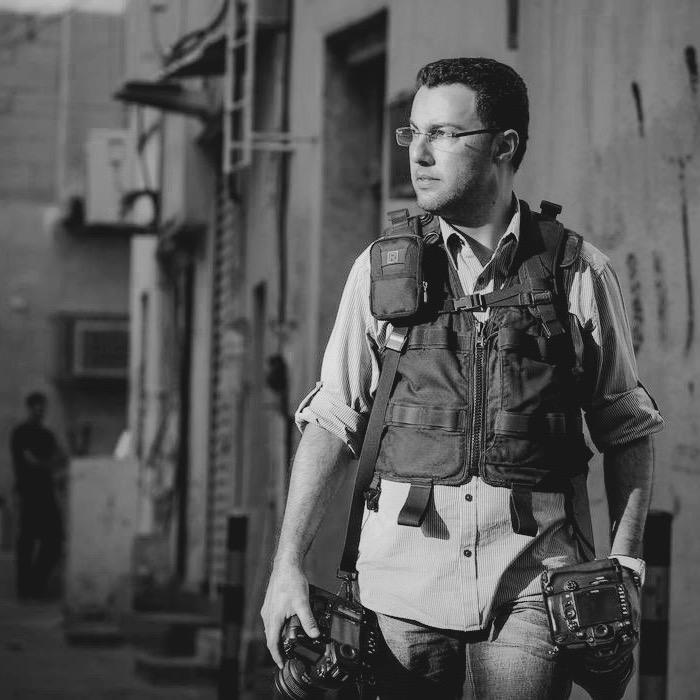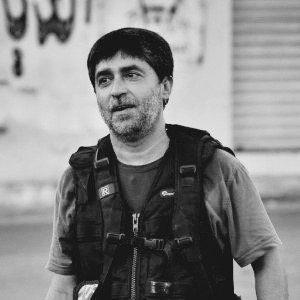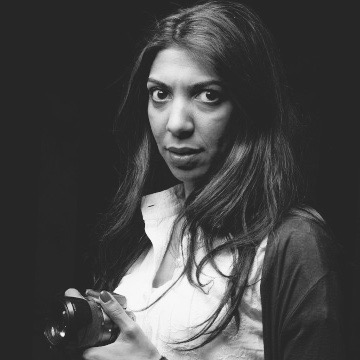The Danish political magazine Ræson published the article below (English) by BCHR's Vice-President Said Yousif Al-Muhafdha on 19 October. Ræson is a completely independent non-profit magazine about politics in Denmark and in the world.
See full article in Danish here.
Is Bahrain the new breeding ground for political extremism?
How the government’s unprecedented crackdown on civil society and human rights might radicalize some of its citizens
By Said Yousef Al-Muhafdah, Vice-President of the Bahrain Center for Human Rights (BCHR)
On 10 September, the newspaper Information headlined that restrictions for immigrants can contribute to radicalization. Reporting on new immigration-related restrictions that are part of the government’s “2025 plan”, it was highlighted that these policies might have a radicalizing effect, particularly among the Muslim community in Denmark.
Following the so-called “hometown terrorism” incidents of Brussels, Paris, Nice and Copenhagen – in which mainly native-born but seemingly disadvantaged and marginalized citizens like Omar el-Hussein, a Dane of Palestinian origin, were the main perpetrators – Danish politicians have voiced concerns about legal restrictions that might foster the radicalization of those who already feel excluded from Danish society. Draconian policies, they warned, might only exacerbate feelings of distrust towards Denmark.
The article leaves the reader with a nagging question, however: If citizens in Denmark - still one of the most liberal, tolerant, open-minded and safest places on earth - acknowledge the risk of radicalization posed by the intensification of restrictions, how much higher is this risk in countries where governments not only restrict people but even subject them to actual harm? More to the point: how much larger is the threat of radicalization when people’s daily lives consist of systematic stigmatization, oppression, persecution and torture?
The small desert island of Bahrain lies off the shore of Saudi Arabia, with which it shares much more connections than just the King Fahd Causeway. Like their Saudi neighbors, Bahrain is ruled by an autocratic dynasty. The Al-Khalifa family is for Bahrain what the Al-Saud’s are for Saudi Arabia: an unquestionable, unchallenged and self-righteous powerhouse that is deeply interwoven with the state structures. They simply can’t imagine their countries being ruled by anyone else.
The Al-Khalifas have ruled Bahrain since 1783 as “Hakims” and “Emirs” before the current monarch, Hamad, who assumed his father Isa’s throne in 1999, declared himself “King” in 2002. Hamad reigns with almost absolute power, while his uncle Khalifa acts as Prime Minister. The latter took office in 1970, when Bahrain was still administered by the British, and he is by now the world’s longest-serving current prime minister.
In February 2011, when the Al-Khalifa dynasty faced its own Arab Spring and looming demise, King Hamad could rely on his Saudi friends and their troops, who rolled in and suppressed the pro-democracy movement with brutal efficacy. Nevertheless, the calls for change have never ceased among the 1.3 million people of Bahrain. For years, demonstrations have taken place on a weekly basis, while the government often responds with an iron fist. In sum: the movement smolders under the surface.
This summer, the Al-Khalifas struck out with a sweeping campaign to silence all dissent and make clear who remains in the driver’s seat of the country. In June, the largest political opposition party Al-Wefaq was dissolved within a few days, their assets liquidated and various members arrested. At the same time, a delegation of Bahraini human rights defenders was prevented from travelling to Geneva to the United Nations Human Rights Council session, and Bahrain’s most prominent activist and the president of BCHR, Nabeel Rajab, was arrested.
The authorities charged Rajab for "spreading false news and rumors about the internal situation in a bid to discredit Bahrain" over Twitter posts from 2015 about well-documented cases of torture in a Bahraini prison. Rajab is facing 15 years if convicted, while still awaiting his repeatedly postponed trial. Early this month, after a letter under his name was published in the New York Times, another charge was added. This charge was based on his claims that the authorities have attempted to threaten him into silence and that, after a meeting with US Secretary of State John Kerry, he was interrogated by Bahrain’s Anti-Cybercrimes unit.
Of course Rajab is just the most prominent victim of the government’s crackdown.
Many other people share Rajab’s fate and have been convicted for their activism or criticism. Under Bahraini law, criticism and insults against the ruling family or state authorities are punishable with up to seven years in prison or a fine of up to 10,000 Bahraini Dinars (175,000 DKK). The laws are left vague, giving space to the authorities to consider criticism and political dissent as insults, incitement of hatred, or even promotion of terrorism. Freedom of expression is thus extremely limited in Bahrain. Since the beginning of 2016, BCHR has recorded ten sentences based on such charges with total prison terms of 27 years and five months.
The internet has become a major battlefield in the government’s war on free expression. Bahrain may have the highest Internet and mobile phone usage in the Gulf region, but Bahrainis feel the least safe expressing their opinion on political issues in the region. Media and telecommunication providers are subjected to excessive restrictions, while tracking software and censorship tools ensure the government can prosecute unwelcome commentators and maintain full control over the flow of information. Online coverage and speed are frequently limited in various parts of the country as acts of reprisal. Hundreds of websites are blocked, many of which have nothing to do with pornography, terrorism or violence, to which the restrictive laws refer. The primary targets consist of sites that present critical views or expose human rights violations. Strikingly, sites affiliated to terrorist groups like Daesh (ISIS) are still accessible in Bahrain - despite it being a counterterrorism partner against Daesh. It is obvious that the government wants to shut down the last window for people’s voices in Bahrain, so the Internet becomes a tool for sharing photos of your dinner, not more. Unsurprisingly, Reporters Without Borders have continuously categorized Bahrain as an “Enemy of the Internet” since 2012.
In addition to cyber space, the government has imposed similar restrictions on physical areas as well. The village of Duraz is currently being besieged and cut off from the rest of the country for more than two months now - the entire town seems to have become an enemy of the state. The approx. 25,000 inhabitants of Duraz are being collectively punished for a peaceful sit-in that started in late June after the government revoked the citizenship of Bahrain’s highest Shia cleric Sheikh Isa Qassim as an act of reprisal, while additionally charging him over accusations of money laundering in relation to one of major Shia religious duties. Thousands of people have since come together outside Sheikh Qassim’s house in Duraz to protest against the decision and keep doing so despite the government’s blockade of the town. Bahraini security forces closed off all roads leading into and out of the town with cement blocks, barbed wire and sandbags. At two checkpoints, people who are not registered residents of Duraz are being prohibited from entering the town area.
As demonstrations are not allowed in Bahrain unless the Ministry of Interior permits them, courts have started to hand down one- to two-year-long prison sentences to Duraz protesters for “illegal gatherings” since late August. Not surprisingly, it is mostly clerics of the Shia community who are prosecuted and convicted over the support for their spiritual leader Sheikh Qassim.
Just as the government disproportionately targets the country’s Shia majority, it simultaneously favors the Sunni minority to which the Al-Khalifa family belongs. However, the crux of the matter is that the Al-Khalifas follow Sunni Islam and typically favor Sunnis when allocating public offices or social benefits. Despite constituting the majority of the population with 60-70%, the Shiites of Bahrain feel discriminated against and extremely underrepresented politically. These feelings were stoked even more by Sheik Qassim’s trial, verdicts against other high Shia clerics, and – last but not least – the dissolution of the largest opposition party Al-Wefaq, a mainly Shiite party.
When we return to the initial question – whether radicalization might grow through intensified restrictions – we, of course, do well to bear this threat in mind. In Denmark it may seem to be a very long shot, but in Bahrain, the chances for home-grown extremism are far more serious.
The civic space in Bahrain is extremely constrained - for anyone, from human rights activists to daily Twitter users, from Shiite cleric to Duraz resident. Almost all parts of the society share certain characteristics, which - according to Antony Blinken from the US Department of State - pave the road towards violence that include “feelings of alienation and exclusion (...), experiences with state sanctioned violence, heavy handed tactics by security services, and the systematic denial of opportunity”.
Is there an actual, safe option to voice criticism or to call for reforms in Bahrain? Hardly. The lack of such available platforms for an exchange of views, paired with a constant threat of punishment and persecution, is the breeding ground for radicalization and extremism. To many who have been imprisoned and tortured for peacefully pursuing change, violence may unfortunately appear to be the only outlet through which to address deepening grievances.
Danish authorities define such radicalization as “a process, by which a person to an increasing extent accepts the use of undemocratic or violent means, including terrorism, in an attempt to reach a certain political/ideological objective.”
Various observers of Bahrain have drawn predictions about possible radicalization trends in response to the government’s repressive policies. During a panel discussion in February 2015, Nabeel Rajab, the detained BCHR president, said that while the Bahraini government is vocally opposed to extremism in the region, it is actually quite tolerant of extremist ideas within its borders, which could lead to increased radicalization within the country.
In fact, the Al-Khalifas keep adding fuel to the fire by actively recruiting Arab and foreign Sunnis for their police and military forces, and more generally as a demographic counterweight against its indigenous Shia majority. Is the old dynasty aware of the side-effects of their intensified anti-Shia and anti-reform policies? Or has the genie already been let out of the bottle and can no longer be controlled?
As early as 2012, Bahrain expert Justin Gengler from Qatar University stressed in a Foreign Policy article that “the government of Bahrain has exploited — even cultivated — the fears and suspicions of other citizens, in particular those of its traditional Sunni support base.” He outlined that many Sunnis, driven by the anti-Shia sentiments of the ruling family, overstepped the mark and went into full opposition “to anyone who would dare suggest political compromise” - including allies like the United States or even King Hamad himself.
In January 2015, the Huffington Post featured an article of two risk analysts, who claimed that “the influence of Daesh sympathizers within the Bahraini government’s political structure has grown as a result of Manama’s authoritarian and anti-Shi’ite policies of the post-Arab Awakening era.” The authors refer to the case of Turki Al-Binali, a Bahraini national and leading IS ideologue, who was allowed to hold a demonstration outside the US embassy in the Bahraini capital Manama, “during which pictures of Osama Bin Laden, as well as al-Qaeda flags, were held up by protesters.”
It is strange to imagine that a country, which is home to the Fifth Fleet of the US Navy and which deployed two fighter jets to bomb Daesh in Syria, follows a seemingly inconsistent anti-terror policy at home. The pressure therefore lies also on Bahrain’s powerful allies and reliable weapons dealers like Saudi Arabia, the United States and the United Kingdom. While the US and UK have a long history of ignoring human rights abuses in favor of stability for their questionable allies, it is obvious that the Saudis, who themselves deal with serious accusations of human rights violations, are not aiming to talk to the Al-Khalifas about reforms.
The question is this: How much longer can Western allies ignore the looming threat of yet another country that drowns in homemade political and religious extremism, or yet another group à la Al-Qaeda or Daesh that mushrooms out of a constant atmosphere of repression, fear and hopelessness?
Moreover, we should not forget Denmark’s role as a political player in this context: On the one side, there is Danish-Bahraini citizen, Abduhlhadi Al-Khawaja - one of the leading figures during the 2011 pro-democracy movement - who serves a life sentence in a Bahraini prison for his peaceful human rights activism. Two of his daughters, Zainab and Maryam, who are activists and Danish citizens themselves, have also been harassed, arrested and threatened by Bahraini authorities. Ultimately, they chose a life in exile in Copenhagen, facing immediate imprisonment if they ever return to Bahrain.
On the other side, there is Bahrain’s King Hamad, who received the order of the Grand Cross of the Dannebrog (Storkorset af Dannebrog) - one of the highest Danish orders. Queen Margrethe presented King Hamad with the order in February 2011 - only two weeks before he called in the Saudi troops. Ultimately, the Danish government and the international community must choose to support peaceful dissent and legitimate demands of rights or violent suppression and absence of reform before it’s too late.
See full article in Danish here.
 Mohammed Al-Shaikh, a photojournalist for Agence France Presse (AFP) based in Bahrain, was notified on 22 September 2016 that his request to renew his permit was denied due to allegedly “biased coverage.” Hence he is prevented from further undertaking his profession. Al-Shaikh has received over 200 international photography awards, one being the Bayeux-Calvados Award for war correspondents by Nikon in 2014 for a
Mohammed Al-Shaikh, a photojournalist for Agence France Presse (AFP) based in Bahrain, was notified on 22 September 2016 that his request to renew his permit was denied due to allegedly “biased coverage.” Hence he is prevented from further undertaking his profession. Al-Shaikh has received over 200 international photography awards, one being the Bayeux-Calvados Award for war correspondents by Nikon in 2014 for a Hasan Jamali, a photographer for the Associated Press (AP), was denied renewal of his license on 15 August 2016 by the Bahraini authorities. On his personal Facebook account he wrote a statement saying, “Hopefully independent journalism will be allowed again in Bahrain soon.”
Hasan Jamali, a photographer for the Associated Press (AP), was denied renewal of his license on 15 August 2016 by the Bahraini authorities. On his personal Facebook account he wrote a statement saying, “Hopefully independent journalism will be allowed again in Bahrain soon.” Nazeeha Saeed, the Bahraini correspondent for Radio Monte Carlo Doualiya and France24, was summoned to the Public Prosecution and notified on 17 July 2016 that she is facing
Nazeeha Saeed, the Bahraini correspondent for Radio Monte Carlo Doualiya and France24, was summoned to the Public Prosecution and notified on 17 July 2016 that she is facing







